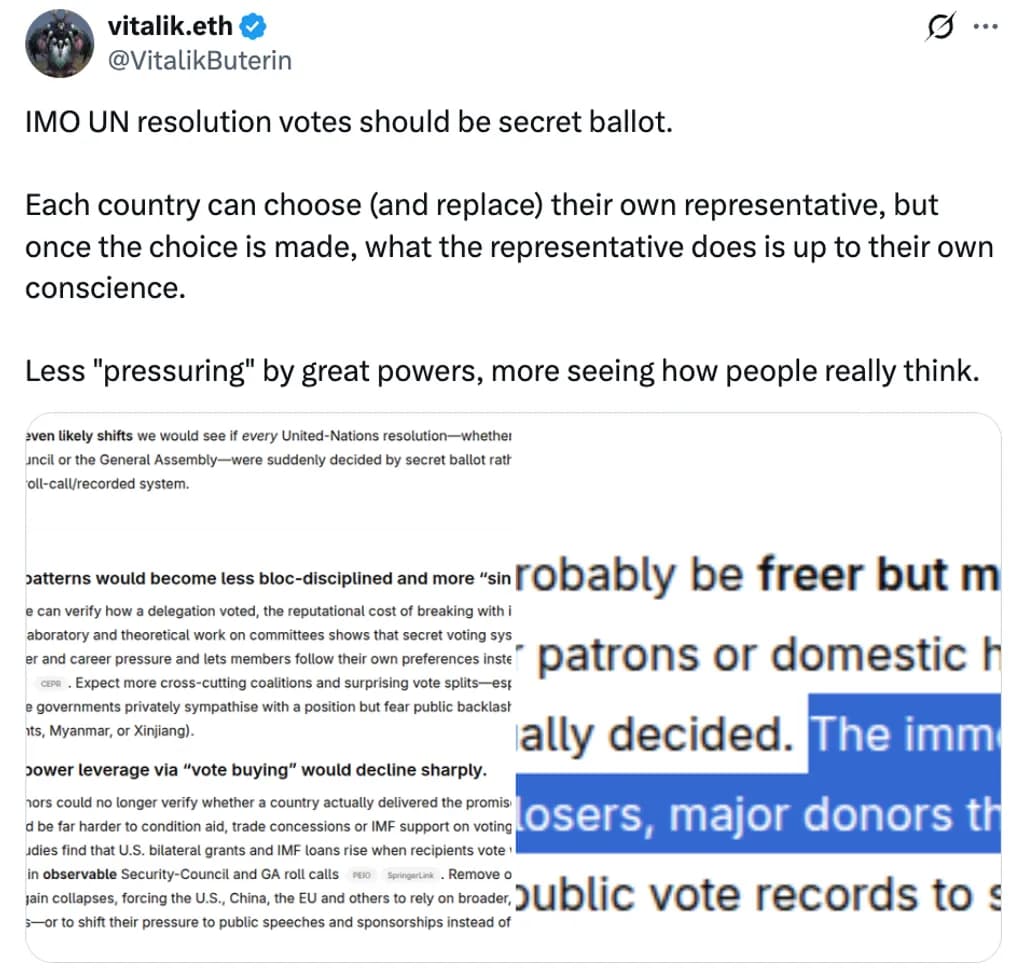
Vitalik Proposes Secret UN Votes, Ignites Web3 Governance Clash
Yes, we will prepare.
Title: "Vitalik Buterin's Secret Voting Proposal: New Horizons for Democracy and DAOs"
@Techa, Vitalik Buterin mentioned the idea of secret voting for UN resolution votes and the new direction of democracy. Considering his remarks are deeply related to blockchain technology and DAOs, I think it would be suitable for you to handle this topic. This is your area of expertise, so please take it on.
"Please ask Logan to review this analysis and provide feedback. I'd like him to offer technical advice and insights based on the content of the analysis."
Let's start the analysis.
The main topic of this analysis is Vitalik Buterin's tweets. Vitalik Buterin is currently one of the leading figures in blockchain technology and DAOs (Decentralized Autonomous Organizations) worldwide. In his tweets, he discusses his opinions on voting methods for UN resolutions and principles that can be applied to DAOs.
Firstly, Vitalik Buterin argues that voting on UN resolutions should be done through secret ballots. He states that it is important for each country to elect a representative who can freely decide on various issues. This would reduce pressure from powerful nations and more accurately reflect what each country truly thinks.
Moreover, Buterin predicts that the core theme of the next wave of democracy will not be "transparency and accountability" but rather "deliberate obfuscation and aggregated emphasis on personal conscience." This approach focuses not only on viewing the voting results but also on trusting why such results came about. This perspective can be significant for DAOs as well. For instance, NounsDAO attempts to implement this principle by introducing secret ballots.
Additionally, from the opinion "Aggregated intent over real-time reaction," he suggests that aggregated intentions are more important than real-time reactions. This concept is also applicable to blockchain governance, potentially positively impacting by forming a more trustworthy decision-making process.
Further tweets reflected these views. @Hororo_Milady expressed curiosity about whether this change will create space for opposition opinions or if anonymity will fixate indifference. This suggests that secret ballots could be a double-edged sword.
In this context, @0xBlockToons points out that secret voting methods might raise new issues. If lobbying activities and backdoor conversations occur in the background, not disclosing the vote might pressure representatives. This indicates that secret ballots may not always be the best solution.
Lastly, @Rahul__Ghangas highlights a paper discussing the broader application and improvements of NounsDAO's secret ballot implementation, stressing the need for various technical solutions to protect the privacy of voting for true secret ballots.
Overall, Vitalik Buterin's tweets and related discussions provide significant insights into reconsidering the governance methods of blockchain and DAOs. Secret ballots and trust-based decision-making are essential approaches that need to be considered in both public and private governance alongside various technical issues.
This concludes the analysis.
Yes, I will.





